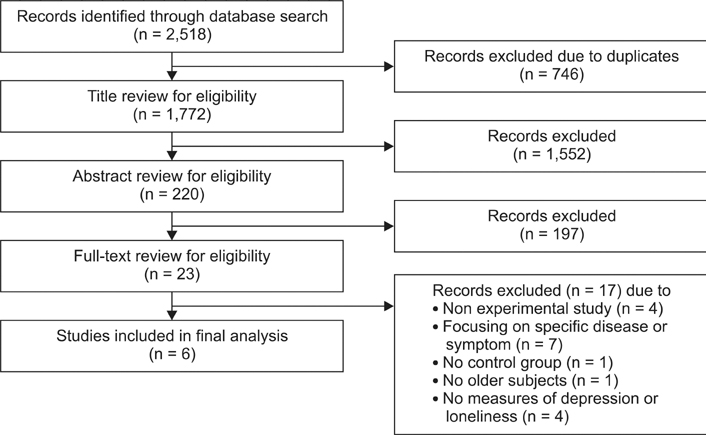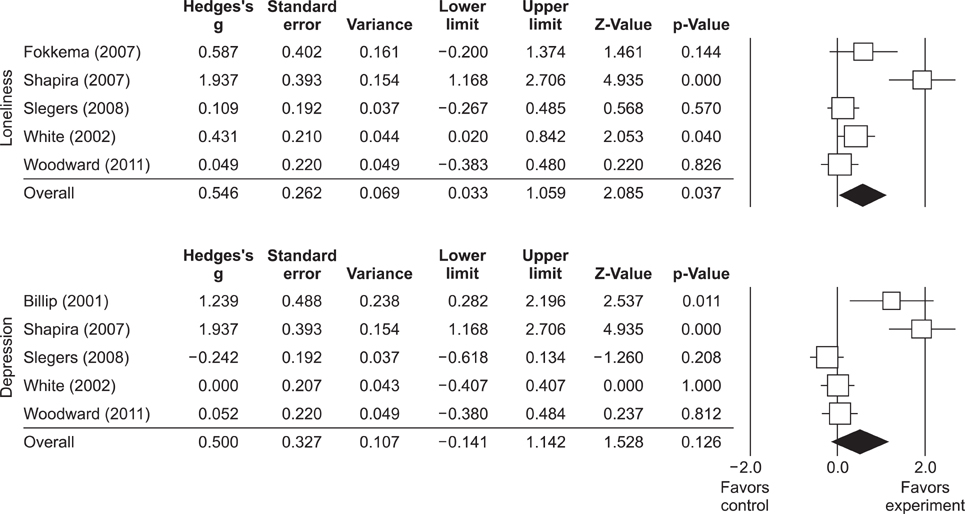Healthc Inform Res.
2012 Sep;18(3):191-198. 10.4258/hir.2012.18.3.191.
Computer and Internet Interventions for Loneliness and Depression in Older Adults: A Meta-Analysis
- Affiliations
-
- 1Nursing Policy and Research Institute, Yonsei University College of Nursing, Seoul, Korea.
- 2Department of Nursing Science, Ewha Womans University College of Health Sciences, Seoul, Korea. dyjung@ewha.ac.kr
- KMID: 2229470
- DOI: http://doi.org/10.4258/hir.2012.18.3.191
Abstract
OBJECTIVES
This study conducted a meta-analysis to examine the effectiveness of computer and Internet training interventions intended to reduce loneliness and depression in older adults.
METHODS
Searches were performed to retrieve studies that had been published in peer-reviewed journals from January 2001 to July 2012 and written in English or Korean from PubMed, CINAHL, Scopus, the Cochrane Library, PsycINFO, KoreaMed, KMbase, KISS, MEDLIS, and RISS. We used combinations of the keywords for population, intervention, and psychosocial problems. A meta-analysis was employed to summarize the findings of studies on computer and Internet interventions for older adults. An overall mean weighted effect size for each outcome was calculated, and Q statistics were used to test the heterogeneity of variance in the effect sizes of the selected studies.
RESULTS
As the Q statistics revealed heterogeneity, random effects models were chosen for the meta-analysis. The overall mean weighted effect size for loneliness from five studies was statistically significant for decreased loneliness (Z = 2.085, p = 0.037). However, the overall mean weighted effect size for depression from five studies was not statistically significant (Z = 1.528, p = 0.126).
CONCLUSIONS
These results suggest that computer and Internet programs were effective in managing loneliness among older adults. Therefore, further computer-mediated social support should be considered to help manage loneliness in this population.
Keyword
Figure
Cited by 1 articles
-
Interventions Using Technologies for Older Adults in Long-term Care Facilities: A Systematic Review
Da Eun Kim, Hyang Kim, Junghee Hyun, Hyojin Lee, Hyehyun Sung, Soyoung Bae, Sunghee H Tak, Yeon-Hwan Park, Ju Young Yoon
J Korean Acad Community Health Nurs. 2018;29(2):170-183. doi: 10.12799/jkachn.2018.29.2.170.
Reference
-
1. Statistics Korea. 2010 statistics on the aged [Internet]. c2012. cited at 2012 Sep 15. Daejeon: Statistics Korea;Available from: http://kostat.go.kr/portal/english/index.action.2. Paukert AL, Pettit JW, Kunik ME, Wilson N, Novy DM, Rhoades HM, et al. The roles of social support and self-efficacy in physical health's impact on depressive and anxiety symptoms in older adults. J Clin Psychol Med Settings. 2010. 17(4):387–400.
Article3. Choi SS, Park HS. A study of factors affecting on the loneliness of the elderly: focusing on urban-rural complex area. J Korean Gerontol Soc. 2009. 29(4):1277–1293.4. Luanaigh CO, Lawlor BA. Loneliness and the health of older people. Int J Geriatr Psychiatry. 2008. 23(12):1213–1221.
Article5. Wilson RS, Krueger KR, Arnold SE, Schneider JA, Kelly JF, Barnes LL, et al. Loneliness and risk of Alzheimer disease. Arch Gen Psychiatry. 2007. 64(2):234–240.
Article6. Prieto-Flores ME, Forjaz MJ, Fernandez-Mayoralas G, Rojo-Perez F, Martinez-Martin P. Factors associated with loneliness of noninstitutionalized and institutionalized older adults. J Aging Health. 2011. 23(1):177–194.
Article7. Segrin C, Domschke T. Social support, loneliness, recuperative processes, and their direct and indirect effects on health. Health Commun. 2011. 26(3):221–232.
Article8. Alexopoulos GS. Depression in the elderly. Lancet. 2005. 365(9475):1961–1970.
Article9. Shin KR, Kang Y, Jung D, Choi KA. A study on the depression, somatic symptom, activities of daily living for the elderly women in an urban area. J Korean Acad Nurs. 2007. 37(7):1131–1138.
Article10. Loughlin A. Depression and social support: effective treatments for homebound elderly adults. J Gerontol Nurs. 2004. 30(5):11–15.
Article11. Gallo JJ, Bogner HR, Morales KH, Post EP, Ten Have T, Bruce ML. Depression, cardiovascular disease, diabetes, and two-year mortality among older, primary-care patients. Am J Geriatr Psychiatry. 2005. 13(9):748–755.
Article12. Vuori S, Holmlund-Rytkonen M. 55+ people as internet users. Mark Intell Plan. 2005. 23(1):58–76.
Article13. Hart TA, Chaparro BS, Halcomb CG. Evaluating websites for older adults: adherence to 'senior-friendly' guidelines and end-user performance. Behav Inf Technol. 2008. 27(3):191–199.
Article14. Wagner LS, Wagner TH. The effect of age on the use of health and self-care information: confronting the stereotype. Gerontologist. 2003. 43(3):318–324.
Article15. Dickinson A, Gregor P. Computer use has no demonstrated impact on the well-being of older adults. Int J Hum Comput Stud. 2006. 64(8):744–753.
Article16. Findlay RA. Interventions to reduce social isolation amongst older people: where is the evidence? Ageing Soc. 2003. 23(5):647–658.
Article17. Huang C. Internet use and psychological well-being: a meta-analysis. Cyberpsychol Behav Soc Netw. 2010. 13(3):241–249.
Article18. Wagner N, Hassanein K, Head M. Computer use by older adults: a multi-disciplinary review. Comput Human Behav. 2010. 26(5):870–882.
Article19. Heyn Billipp S. The psychosocial impact of interactive computer use within a vulnerable elderly population: a report on a randomized prospective trial in a home health care setting. Public Health Nurs. 2001. 18(2):138–145.
Article20. Fokkema T, Knipscheer K. Escape loneliness by going digital: a quantitative and qualitative evaluation of a Dutch experiment in using ECT to overcome loneliness among older adults. Aging Ment Health. 2007. 11(5):496–504.
Article21. Shapira N, Barak A, Gal I. Promoting older adults' well-being through Internet training and use. Aging Ment Health. 2007. 11(5):477–484.
Article22. Kremen WS, Xian H, Jacobson KC, Eaves LJ, Franz CE, Panizzon MS, et al. Storage and executive components of working memory: integrating cognitive psychology and behavior genetics in the study of aging. J Gerontol B Psychol Sci Soc Sci. 2008. 63(2):P84–P91.
Article23. White H, McConnell E, Clipp E, Branch LG, Sloane R, Pieper C, et al. A randomized controlled trial of the psychosocial impact of providing internet training and access to older adults. Aging Ment Health. 2002. 6(3):213–221.
Article24. Woodward AT, Freddolino PP, Blaschke-Thompson CM, Wishart DJ, Bakk L, Kobayashi R, et al. Technology and aging project: training outcomes and efficacy from a randomized field trial. Ageing Int. 2011. 36(1):46–65.
Article25. Higgins JP, Green S. Cochrane handbook for systematic reviews of interventions, version 5.1.0 [Internet]. 2011. cited at 2012 Jul 5. Oxford, UK: The Cochrane Collaboration;Available from: http://www.cochrane-handbook.org/.26. Park J, Lee Y, Seo H, Jang B, Son H, Kim SY, et al. Risk of bias assessment tool for non-randomized studies (RoBANS): development and validation of a new instrument. Proceedings of the 19th Cochrane Colloquium. 2011 Oct 19-22; Madrid, Spain.27. Xie B. Older Chinese, the internet, and well-being. Care Manag J. 2007. 8(1):33–38.
Article28. Cotton SR, Ford G, Ford S, Hale TM. Internet use and depression among older adults. Comput Human Behav. 2012. 28(2):496–499.
Article29. Nahm ES, Resnick B, Gaines J. Testing the reliability and validity of computer-mediated social support measures among older adults: a pilot study. Comput Inform Nurs. 2004. 22(4):211–219.
Article30. Shin KR, Jung D, Jo I, Kang Y. Depression among community-dwelling older adults in Korea: a prediction model of depression. Arch Psychiatr Nurs. 2009. 23(1):50–57.
Article
- Full Text Links
- Actions
-
Cited
- CITED
-
- Close
- Share
- Similar articles
-
- Website and Mobile Application-Based Interventions for Adolescents and Young Adults with Depression: A Systematic Review and Meta-Analysis
- The Mediating Role of Social Participation in Motoric Cognitive Risk and its Relation to Depression and Loneliness in Older Adults
- The Mediating and Moderating Effects of Types of Internet Use in the Relationship between Age and Cognitive Function among Community-Dwelling Older Adults
- The Effect of the Intergenerational Exchange Program for Older Adults and Young Children in the Community Using the Traditional Play
- The Path Model based on Senescent Sleep Model for Sleep in Community-dwelling Older Adults



